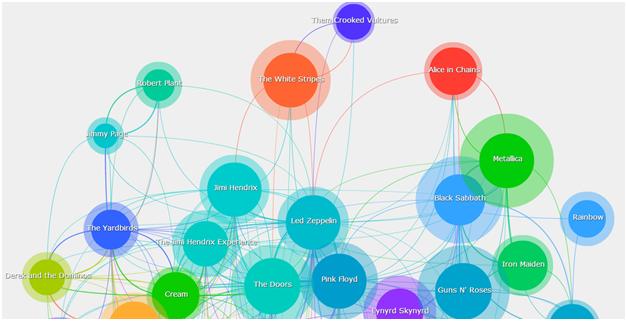For decades and decades, there was never any doubt about how consumers discovered new music, new artists, new albums, and new releases. Apart from word of mouth from friends, siblings, roommates, and perhaps in recent years, sources like MTV, it was always about one source:
Radio.
But in recent years, that dominance has been disrupted by the long tail of new media, music websites, digital jukeboxes, satellite radio, TV shows, and everything in between.
And even tools like Live Plasma (seen below for a search of similar artists to the White Stripes) have tried – and not always succeeded – in linking us to bands and music that we might like.
And much to the chagrin of radio programmers who get frustrated when they see record labels and artists suck up to outlets that pale in comparison to the reach and power of FM music stations, this topic continues to be more prominent as everyone’s trying to horn in on the discovery game.
And that’s why when research comes out that tells what we have always suspected – radio is still #1 when it comes to music discovery – it shouldn’t come as a great surprise.
Nielsen’s recently released Music 360 report reaffirms radio’s leadership role in the discovery process. According to their data, more than six in ten (63%) respondents find out about new music via FM radio.
Yes, they stream. And in fact, two-thirds have done so in the past year – a whopping increase of 40% in just a year. But as we well know, radio is a part of the streaming story, too. Just about every radio station now offers a streaming option, most have apps, and the explosion of services from iHeartRadio to TuneIn have facilitated radio’s presence in the digital streaming world.
But we also know radio’s likely trajectory in the long-term ownership of the music discovery hill. A decade ago, radio’s dominance in this arena was much stronger. And moving forward, “newcomers” like YouTube, Pandora, iTunes Radio, and others will continue to chip away at radio’s historic dominance. As streaming continues to become a more mainstream activity, as Wi-Fi connectivity becomes more ubiquitous, and as in-car systems become more user-friendly, consumers will be better able to find music they like on their own terms.
Algorithms will also become more sophisticated, learning from the behavior and tastes of consumers, refining tastes and sharpening search activities.
So what’s radio’s play? Does the medium sit there and watch its lead erode year after year? Or does it build on its inherent and historic strengths to create discovery tools that are warmer, richer, more personal, and even more local than what consumers might get from faceless digital music services?
And while they don’t acknowledge that anything’s changed in their well-known but mysterious “genome project” algorithm, many feel that Pandora has become more conservative, failing with more frequency to deliver new music and new artists in ways that satisfy and enchant consumers.
That’s why web voting, personality curation, and crowd sourced services like LDR are all part of the discovery process that radio could be utilizing to delight its listeners, while providing new, innovative, and more personal ways to find out what’s new.
 While ratings pressure has made radio exposure for new artists more arduous for record labels, the fact is that there have always been tough-to-crack media gatekeepers throughout history. An appearance on American Bandstand or the Tonight Show was never easy. Same with Saturday Night Live or Late Night. And in radio terms, the well-known Rosalie Trombley was famous for her high standards for adding new singles on CKLW. Legendary stations from WABC to WLS always made it tough to get that “add,” especially for new artists.
While ratings pressure has made radio exposure for new artists more arduous for record labels, the fact is that there have always been tough-to-crack media gatekeepers throughout history. An appearance on American Bandstand or the Tonight Show was never easy. Same with Saturday Night Live or Late Night. And in radio terms, the well-known Rosalie Trombley was famous for her high standards for adding new singles on CKLW. Legendary stations from WABC to WLS always made it tough to get that “add,” especially for new artists.
But great music and the talented people who make it usually find a way to get heard and talked aobut. That’s why artists that might have flown “under the algorithm” when they first try to break out (think Lorde, Gotye, etc.) are more” discoverable” by real people and the radio stations they work for.
But in order to succeed in the new world order of music discovery, radio has to do more than just play new music and new artists in the same unimaginative way it always has. And that’s where the digital tools come into play.
Reinventing music discovery is something any great radio brand can do. At its disposal are deeper richer resources from HD2 stations to mobile apps to Google Hangouts. All of these “gadgets” allow radio to bring the music closer to consumers, giving them a chance to vote and voice their opinions. The local music scene – very vibrant in many markets – could be showcased with its own mobile app, facilitating new relationships as well as sources of income for imaginative sales reps who work the hometown clubs and venues.
As we have discussed many times in this space, combining innovation with heritage is the way to avoid becoming the next disrupted-out-of-existence medium.
Radio should revel in this new Music 360 study – for about an hour. And then it should get busy dreaming up how it can add to its historic lead, how it reinvents itself to modernize, personalize, and localize music discovery, and how it uses the digital tool box to enhance its position, rather than viewing tech and gadgets as interlopers and disruptors.
From Blockbuster to Newsweek to Borders, great media outlets that myopically focused on the way they’d always done it have been kicked to the curb and replaced by technology and brands that are simply better.
The medium and its biggest and smartest companies would be wise to not wait until that Music 360 study of the future reports that radio is about to be overtaken by new media channels and platforms.
Music discovery is a perceptual gold mine and another way that radio can remain viable moving forward. It is a deep part of the history of the medium. We can all remember new songs and great bands that we first heard on the radio.
Now we have to earn that position – again.
So what else is new?
- What To Do If Your Radio Station Goes Through A Midlife Crisis - April 25, 2025
- A 2020 Lesson?It Could All Be Gone In A Flash - April 24, 2025
- How AI Can Give Radio Personalities More…PERSONALITY - April 23, 2025






Definitely worth an e-mail blast to my friends & colleagues in the biz. Most radio/talent consultants that have been around for decades, are stuck in the 80’s & 90’s. A read like this justifies why you have become my favorite consultant over the years.
Lu, much appreciated. Thanks for reading our blog.
Fred, on the other end of the spectrum, the strange thing for some of these artists like Lorde and Goyte is technology is a such a blessing and such a curse. These artists blow up so fast that they aren’t ready for it. Lorde only had 4 songs on an EP when she blew up and they had to rush in and record an album so she could actually tour. And for her and Goyte, where do they go next? They are already so mainstream, they can’t dare make an alternative record again. Once you’re Pop, your Pop… once soccer mom’s know who you are, you’re not cool anymore. It’s going to be very interesting to see what happens.
Great perspective, Eric, on how artist perceptions are affected by the changing discovery technology.